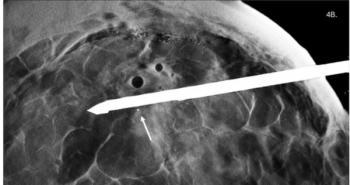
Personal attention, professional setting support interventional oncology
A successful practice in interventional oncology needs dedicated clinical space, committed support staff, and intense physician involvement with patients, according to participants at a symposium on building an IR oncologic practice at the 2006 Society of Interventional Radiology meeting in Toronto in early April.
A successful practice in interventional oncology needs dedicated clinical space, committed support staff, and intense physician involvement with patients, according to participants at a symposium on building an IR oncologic practice at the 2006 Society of Interventional Radiology meeting in Toronto in early April.
Patients want to see physicians in a place that looks like a doctor's office, not in a little room off of the angio suite, according to Dr. Catherine Tuite of the University of Pennsylvania Health System.
All of the presenters hammered home the importance of a clinical setting that feels like a doctor's office, not an imaging suite.
"People expect that if they're coming to see a doctor in a office that the place looks like a doctor's office, not a little room off of your angio suite," said Dr. Catherine Tuite of the University of Pennsylvania Health System. "They want to see you as a doctor in an office, not running out with your scrub cap on from a procedure that you just finished two minutes earlier. When you're starting out your practice, it may not be feasible to have dedicated clinical time, but it's certainly a goal that you should strive for. I think it is an attainable one, even with a small staff."
This patient-friendly setting is a key external sign that an interventional oncologist has made the shift from diagnostician to therapeutic caregiver, said Dr. Thierry De Baere of the Institut Gustave-Roussy in France.
Patients expect a higher level of personal care than many interventional radiologists are used to giving in other aspects of their practice. The support staff an interventional oncologist has available goes a long way to providing this level of patient care. Most presenters suggested hiring nurse practitioners or physician assistants to help with patient care, as well as research nurses and RNs. Research fellows can be highly useful if the interventional oncologist is working in an academic setting.
These support staff, while vital, are not a substitute for physician involvement with patients, according to Dr. Jeff Geschwind of the Johns Hopkins Medical Institutes.
"You need to spend time with the patients and explain clearly and in detail all steps of the treatment," Geschwind said. "Communicate sincerely about what to expect in terms of side effects, complications, tumor response, disease progression, quality of life issues, end of life issues, and further therapeutic options."
Dr. Catherine Tuite
Presenters warned that most interventional oncology patients will be very well informed on new treatment options, current research, and alternate therapies. Interventional oncologists must keep up with the literature, or patients will be more informed than they are.
Newsletter
Stay at the forefront of radiology with the Diagnostic Imaging newsletter, delivering the latest news, clinical insights, and imaging advancements for today’s radiologists.













